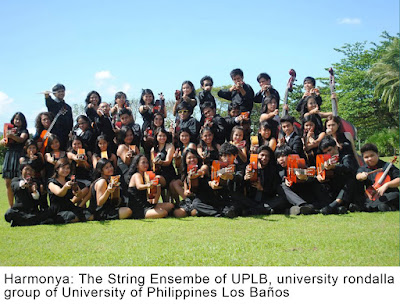The more than
three centuries of Spanish colonization have marked Philippine society and
culture, from the buildings around us to the words we speak. Most of these
influences have been adapted and reclaimed through the infusion of Filipino
flavor.
An example of
this is the Filipino rondalla, an ensemble of stringed instruments that are
played using the plectrum or pick. All are made from locally available
materials like tortoise shell and indigenous wood.
This source of
national pride and identity was showcased at the Cultural Center of the
Philippines (CCP) last February 13-16, 2014. The best rondalla groups here and
abroad put together their bandurrias, ukuleles, and guitar.

Strings were humming with celebratory music for the Philippine Rondalla Festival—an apt musical salvo for the National Arts Month and a prelude to Cuerdas Global: 4th International Rondalla/Plucked String Festival.

Strings were humming with celebratory music for the Philippine Rondalla Festival—an apt musical salvo for the National Arts Month and a prelude to Cuerdas Global: 4th International Rondalla/Plucked String Festival.
The Festival
was presented by the National Commission for Culture and the Arts (NCCA) and
the CCP, in partnership with the Musicology Society of the Philippines and in
cooperation with University of the Philippines Center for Ethnomusicology.
In the opening
ceremony at the Tanghalang Aurelio Tolentino, CCP Vice President and Artistic
Director Chris Millado emphasized the importance of music in forging
camaraderie between communities, even nations, thus highlighting the festival’s
theme “Kuwerdas ng Pagkakaisa” (Strings of Unity).
According to
him, the music of the rondalla is the music of the Filipino’s everyday life,
with each string plucked to make a whole ensemble. This spirit of harmony was
also pointed out by Commissioner Victorino Manalo of the NCCA when he compared
the Western string ensemble to the Filipino rondalla since the latter’s jovial
tempo allows the musicians to smile at each other between beats.
Quite
importantly, especially in these post-Typhoon Yolanda times, the rondalla’s
festive music aligns with the National Arts Month’s campaign for 2014 to use
art activities for healing and uplifting the spirits of those who were affected
by the recent calamities.
Before formally
opening the three-day affair, Festival Director Ramon P. Santos recounted the
Kuwerdas’ decade-old history which spans the entire archipelago, from Luzon to
Mindanao. The Festival was born in Naga City in 2004 and the following editions
were held in Dumaguete in 2007, Tagum in Davao del Norte, Quezon City in 2011.
These past
festivals were not only participated in by the best Philippine groups, but also
by plucked string ensembles from Russia, USA, Indonesia, Iran, Japan, Myanmar,
and North and South Korea, among others.
For 2014, the
seven selected Philippine rondalla groups that have undergone rigorous
auditions were the Celso Espejo Rondalla from L as
Piñas City, Dipolog Community Rondalla from Zamboanga del Norte, Harmonya: The
String Ensemble of the University of the Philippines-Los Baños, Kabataang Silay
Rondalla Ensemble from Negros Occidental, Lucban Pahiyas Community Rondalla
from Quezon, Maco Heights Central Elementary School Rondalla from Compostela
Valley, and the UP Rondalla from Diliman.
They were also
joined by the Fu-shing Junior High School Plucked String Band from Yilan,
Taiwan, the Nationa l Taiwan Normal
University (NTNU) Chinese Plucked Instruments Ensemble from Taipei, the Phong
Nguyen Ensemble from Vietnam, and Sundanese Kacapi Ensemble from Indonesia.
Aside from the concerts and recitals by these groups,
other highlights of the festival were the forum on rondalla instrument
development, an exhibition on the Philippine rondalla, and a recognition
ceremony for distinguished rondalla masters, composers, and musicians.
With such
interest in preserving the rondalla tradition, the spirit of Filipino music
will not falter and each plucked string will continue to echo the music of the
Philippines’ identity across international borders.
Source/s: https://sssip.wordpress.com/2014/01/25/international-rondalla-festival-kicks-off-in- manila/
http://www.choosephilippines.com/do/history-and-culture/1185/philippine-rondalla -festival






Masyadong mong ginagalingan bes. haha
TumugonBurahinVery interesting
TumugonBurahinnice!
TumugonBurahin